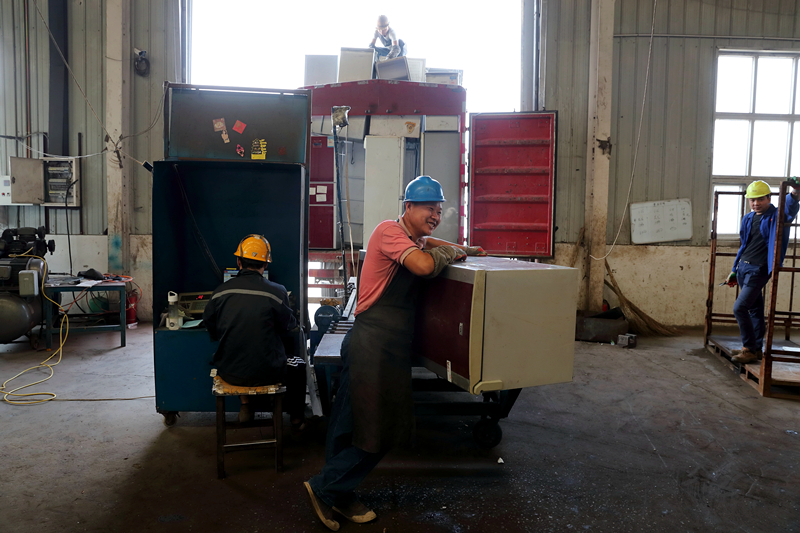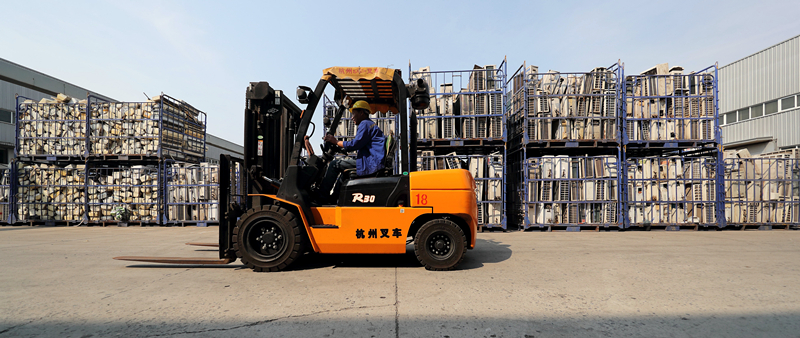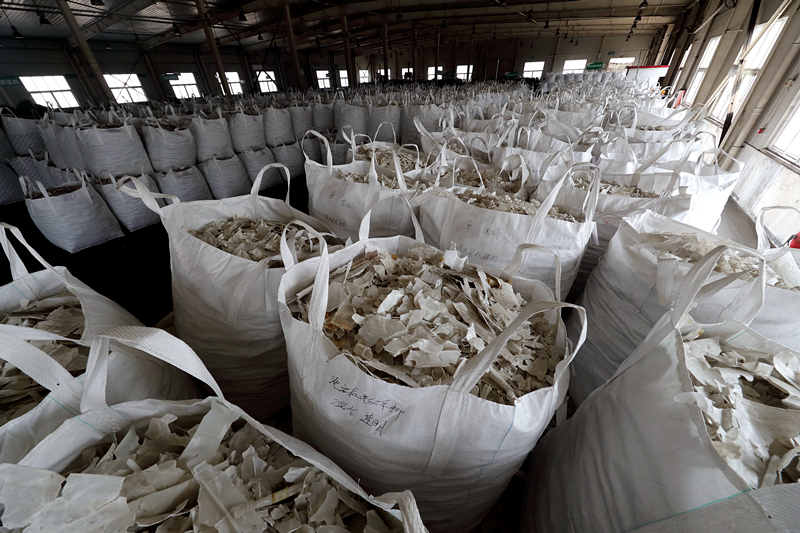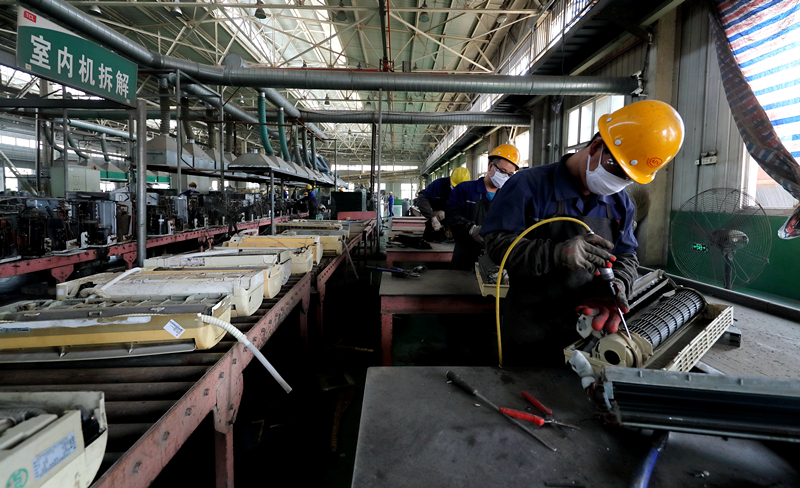Experts call for change in outdated methods and mindsets

A worker at TCL-AOBO Environmental Protection and Development Co moves a discarded fridge for his colleagues to dismantle. WANG JING/CHINA DAILY
Every day, Ma Xianjin rides his tricycle to a public trash collection station in Beijing's Fengtai district. After putting up a piece of cardboard that states "I buy household appliances" near the gate to the station, he waits for business.
"On most occasions, customers come because the guards at the gate of the nearby community tell them I am here," said Ma, who is in his 40s. "Many of the guards see me moving unwanted appliances out of communities, and in this way learn that I am doing business."
Ma said he sells appliances he collects on the same day. "With just a phone call, buyers will arrive in their trucks to take them in the evening," he said. He pays about 30 yuan ($4.40) for a washing machine and the same for a refrigerator.
He said business is good enough for him to make a living. However, he does not know where the appliances end up or whether they will create pollution if not properly disposed of.
With no formal collection systems for electronic waste in China, people such as Ma are filling the gap. However, many appliances collected by businesses such as his are dismantled by unqualified companies that spend little on pollution control efforts.
Such businesses have also been criticized by experts and industry insiders for making the cost of recycling e-waste too high. The businesses also are partly blamed for the difficulties of a pilot program for recycling home appliances that is supposed to be extended to other industries.
By the end of this year, China will completely ban imported waste which can be replaced by that produced domestically, to enable recycling companies to clear more.
As a result, an efficient collection channel has become increasingly important for the country, experts said.
Despite a series of government efforts, including a law amendment and setting up a new department to oversee management of solid waste, the country also urgently needs to change the mindset where too much money is being demanded for discarded e-waste.
As part of its efforts to promote recycling, in 2011, the government started piloting the extended producer responsibility system, which is designed to link the costs associated with products throughout their use with their market price.

Electronic waste is stockpiled at TCL-AOBO in Tianjin. WANG JING/CHINA DAILY
Under the pilot program, 109 companies were licensed to handle five types of e-waste: refrigerators, TVs, washing machines, air conditioners and computers. For each item, they receive up to 130 yuan from a government fund. Manufacturers of these products hand between 7 and 13 yuan to the fund for each unit they produce.
The 109 companies have a combined annual capacity of 150 million items of e-waste. However, delayed payments have forced many of the factories to reduce their operations because of financial difficulties, insiders said.
In September, the China Resources Recycling Association wrote to the Ministry of Finance and the Ministry of Ecology and Environment, who jointly control the fund, warning that one-third of the companies in the pilot program had stopped operating and another one-third were in danger of going bust.
In its letter, the association urged the ministries to immediately pay money owed to the recycling companies.
Yu Keli, secretary-general of the electronic products division of the China National Resources Recycling Association, said cutbacks meant that 78 million e-waste items were processed in 2017, and the figure is expected to have fallen further last year.
He said some businesses are operating at only 20 percent of capacity, the minimum required to qualify for subsidies.
Payments were delayed mainly because much of the old e-waste was taken in by the 109 companies along with newly abandoned items, resulting in them handling an amount beyond expectations, and a shortage of funding to subsidize this, Yu said.
Despite the problems, the system has won widespread recognition, but the government needs to take some measures to improve it, for example, to adjust the subsidies paid for different products based on the size of the funding pool, Yu added.
Wang Chunlin, general manager of TCL-AOBO Environmental Protection and Development Co, one of the 109 companies, said his business has not received a subsidy since 2015.
He echoed Yu in saying that a large stockpile is one of the factors to blame for the situation. The system has only been in place for a short time, and the problems will be addressed in the long term, he said.
Established in Tianjin with investment of 300 million yuan, Wang's company dismantles about 2 million e-waste items annually.

Plastic from home appliances piles up in a warehouse at the company before being recycled. WANG JING/CHINA DAILY
A draft revision of the Law on the Prevention and Control of Environmental Pollution Caused by Solid Waste, which includes the model now used for e-waste, has been released for public opinion.
Wang said this law could play an important role in the booming e-waste recycling market, and may result in many major electronics companies investing in this industry, as it will become compulsory for them to contribute.
He said that with a stronger financial capability and sense of social responsibility, these companies can do a better a job in preventing pollution during handling procedures.
Executives and experts also called for outdated collection methods and mindsets to change, adding that even when subsidies are paid on time, enterprises in the sector still struggle with slim profit margins.
Mao Da, policy consultant at the China Zero Waste Alliance, an NGO, said, "Without subsidies, it's almost impossible for e-waste recyclers that control pollution to make a profit if they have to pay for discarded electronic items.
"This puts recyclers operating legally at a disadvantage when competing with illegal ones that spend almost nothing to prevent pollution, as households tend to sell their waste to those who pay more," he added.
Industry insiders say the huge number of middlemen-especially small-scale, unlicensed scrap dealers-and the fact that consumers still expect money in return for unwanted home appliances drive up the price of reusable waste.
Mao said governments should crack down on e-waste being dismantled illegally, to ensure it is properly disposed of. "Once rogue recyclers disappear, people will gradually change their mindset on demanding compensation for the e-waste they discard," he said.
Wang, at TCL-AOBO, said the high price of waste means his company makes only 10 to 20 yuan from every TV set it dismantles, and this includes the subsidy.

Workers dismantle washing machines at TCL-AOBO. WANG JING/CHINA DAILY
He blamed the low margins on the gap between the source and recycler, saying that some e-waste is traded at least three times before it reaches his plant, and each time this happens, it pushes up the price.
Yu, at the China National Resources Recycling Association, suggested cutting out the middlemen by setting up public collection points where families could leave large home appliances to be sent directly to licensed recyclers.
Mao also said some of the money from the fund could be used to help establish a direct connection between recyclers and consumers.
"The government could set up a nonprofit, like the one for household garbage treatment. Or it could choose to place all the responsibility on manufacturers and get them to establish a system. Each of them could dismantle a certain amount of e-waste based on their output," he said.
Yu said manufacturers should play a bigger role by upgrading products to make them more recyclable and by investing in green businesses.
As an example of this, TV manufacturer TCL is a partner in Wang's plant in Tianjin.
Streamlining the collection system is seen as key to keeping recycling plants running, particularly with demand set to increase when the pilot program is expanded to include auto parts and paper-based packaging, among other types of waste.
Chinese discard about 120 million items of e-waste every year, according to the National Bureau of Statistics. In September, the Ministry of Ecology and Environment set up a new department for solid waste and chemicals.
Mei Fengqiao, an associate professor of environmental management at Peking University, said the move shows the government attaches great importance to the issue, but "the situation will become grimmer as the volume of household and industrial waste rises".
Improper waste management, which results in untreated piles of trash and dirty scrap yards, contributes massively to soil, air and water pollution, Mei said, so a sound collection and storage system would boost environmental protection.

